Acne is a stubborn and often distressing condition that affects individuals across a wide age spectrum, not just teenagers. As a treatment, retinol has long been praised for its ability to transform skin, reduce breakouts, and improve overall texture. Yet, for many who begin using it with high hopes, the experience can be surprisingly disheartening. Rather than immediate improvements, some users find that their acne worsens in the first weeks. This unsettling phenomenon leads to a common question: why does retinol cause acne flare-ups before delivering clearer skin?
You may also like: How to Choose Skin Care for Fine Lines: Evidence-Based Tips for Healthier, Younger-Looking Skin
This article explores that paradox in detail, unpacking the science behind retinol and pimples, the process of purging, and the broader implications for both skin and mental well-being. We also delve into whether retinol is good for acne, how to distinguish between normal purging and adverse reactions, and how users can navigate the early phases of treatment without giving up prematurely. Ultimately, understanding what retinol does for acne—both short-term and long-term—can empower users to manage expectations and maximize their results.
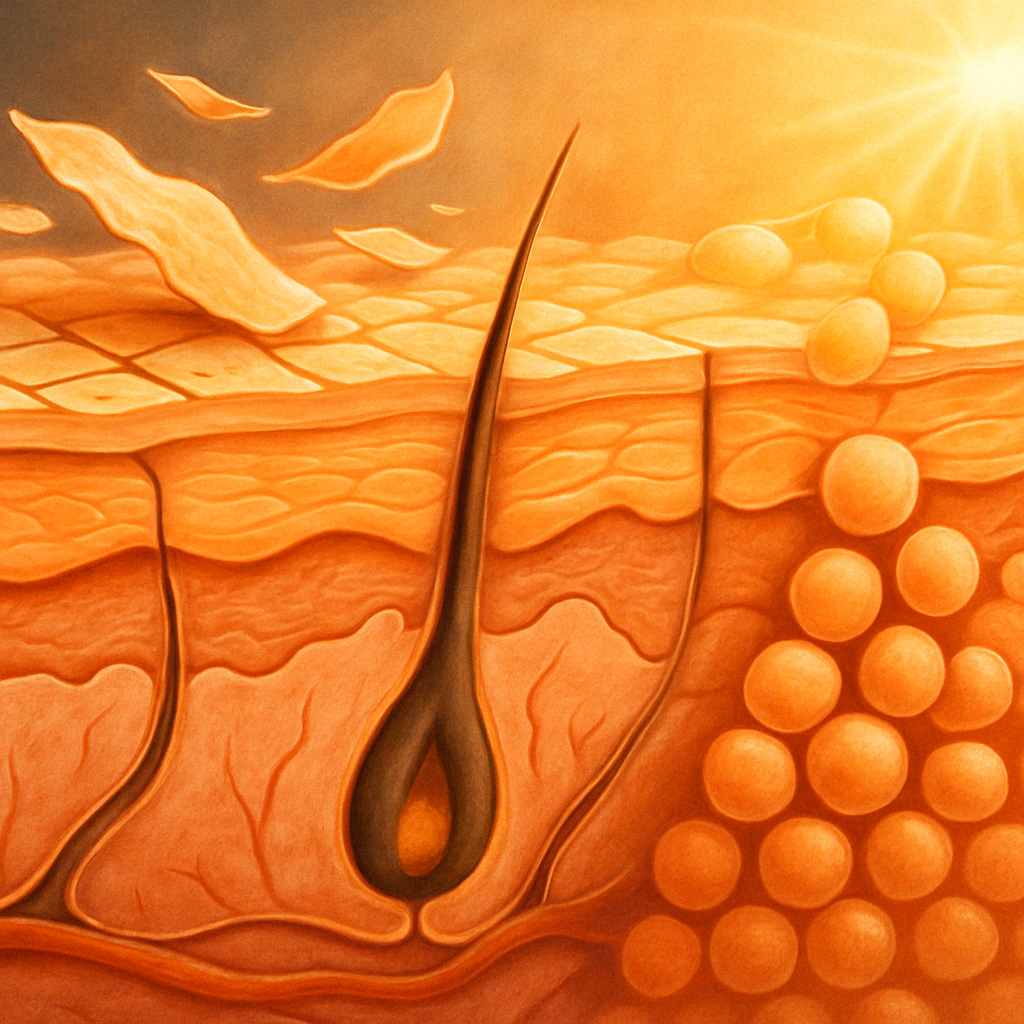
Understanding Retinol and How It Works on Acne-Prone Skin
Retinol is a derivative of vitamin A, and when applied topically, it interacts with the skin at a cellular level. This compound speeds up cell turnover, meaning it prompts skin cells to shed more rapidly, allowing newer, healthier cells to surface. As part of this accelerated process, it also helps unclog pores, reduce the appearance of fine lines, and stimulate collagen production. These benefits make it a mainstay in dermatological protocols, especially for acne and aging concerns.
But the very mechanism that makes retinol effective also explains why it can lead to initial breakouts. By increasing cell turnover, retinol may push existing microcomedones—the invisible blockages in pores—to the surface. What emerges are visible pimples, cysts, or blackheads that might not have become inflamed had the retinol not hastened the process. This phenomenon is commonly referred to as “purging.”
The key distinction here lies in understanding that retinol does not inherently cause acne; rather, it accelerates the cycle of acne that was already forming beneath the skin. Therefore, the question isn’t whether retinol causes acne but why retinol sometimes appears to make acne worse initially. This is critical when addressing concerns such as “can retinol cause acne” or “why does retinol cause acne.” It’s not a true breakout in the pathological sense but a transitional phase toward clearer skin.
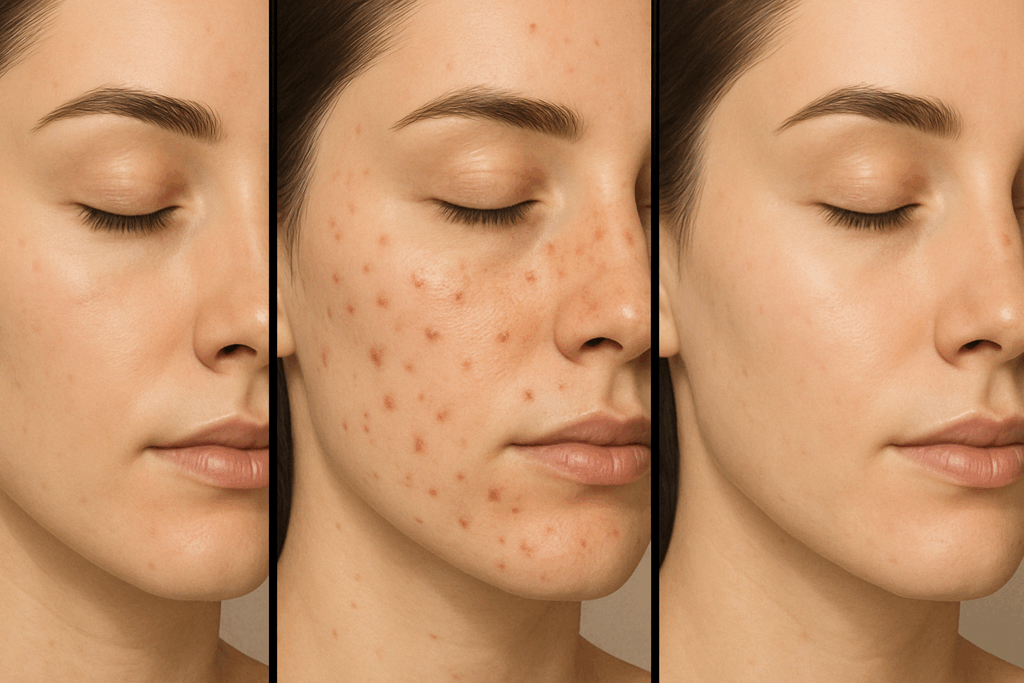
The Purging Process: What to Expect and Why It Happens
When individuals begin using retinol for acne, one of the first concerns that may arise is the so-called “purge phase.” It typically begins within the first week or two of use and can last anywhere from four to six weeks, though the timeline varies from person to person depending on skin sensitivity, acne severity, and the strength of the retinol product.
During purging, many users notice that their acne appears more widespread or inflamed than before starting treatment. It’s important to recognize that this phase is not an indication that the retinol is causing new acne, but rather that it is surfacing existing congestion more quickly. In other words, the retinol is doing exactly what it is supposed to do. For those wondering, “does retinol cause pimples?” the answer lies in differentiating purging from irritation or product incompatibility.
Increased breakouts during this time can include whiteheads, blackheads, and small pustules, often concentrated in areas where breakouts typically occur. It is rare for purging to create acne in places not usually affected, and if that occurs, it may suggest irritation rather than purging. Understanding this difference is essential to determining whether to stay the course or consult a dermatologist about modifying the regimen.
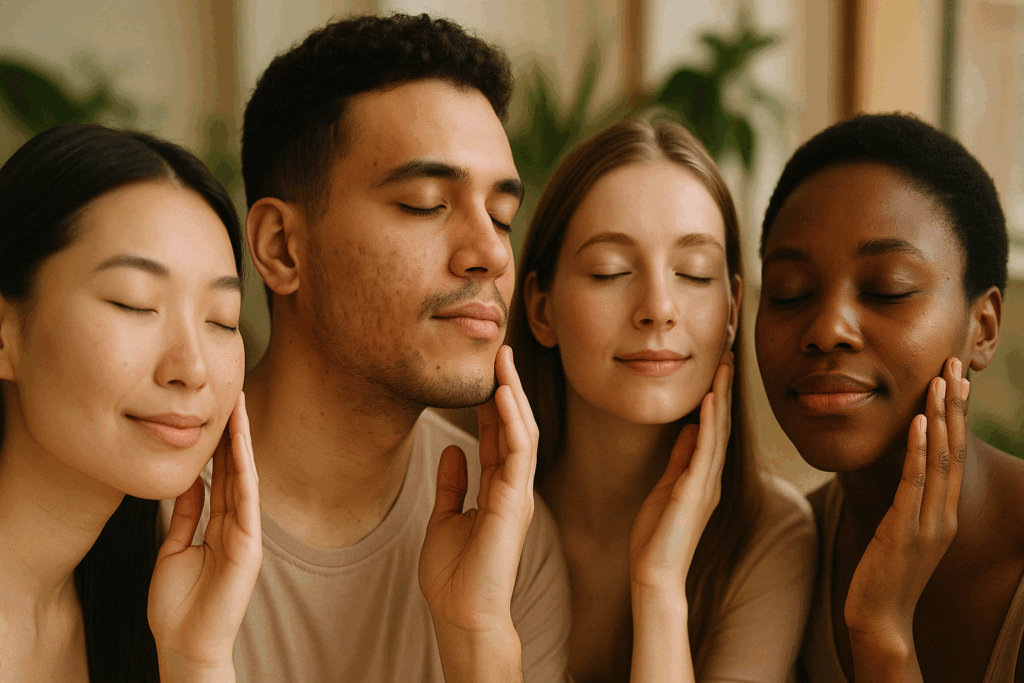
Is Retinol Good for Acne, Pimples, and Scarring?
Despite the challenges of the initial phase, there is substantial evidence that retinol is good for acne and related skin conditions in the long term. Clinical studies show that retinoids reduce both inflammatory and non-inflammatory acne lesions by preventing clogged pores, reducing bacteria, and moderating oil production. Over time, consistent retinol use can significantly diminish the frequency and severity of breakouts.
Moreover, retinol’s role in increasing collagen production and cell turnover makes it beneficial not just for active acne but also for post-acne scarring. For those asking, “is retinol good for acne scarring?” the answer is yes—with some caveats. While retinol can improve the appearance of atrophic scars and uneven pigmentation, deep scars may require additional treatments like microneedling or laser therapy. Nevertheless, incorporating retinol into a broader acne management plan can yield meaningful improvements for both active breakouts and residual acne spots.
Users often want to know, “can retinol help with acne?” and the research supports a confident yes, particularly when used under medical guidance. When applied consistently and paired with supportive skincare, retinol for acne spots becomes one of the most effective over-the-counter and prescription-based strategies available today.
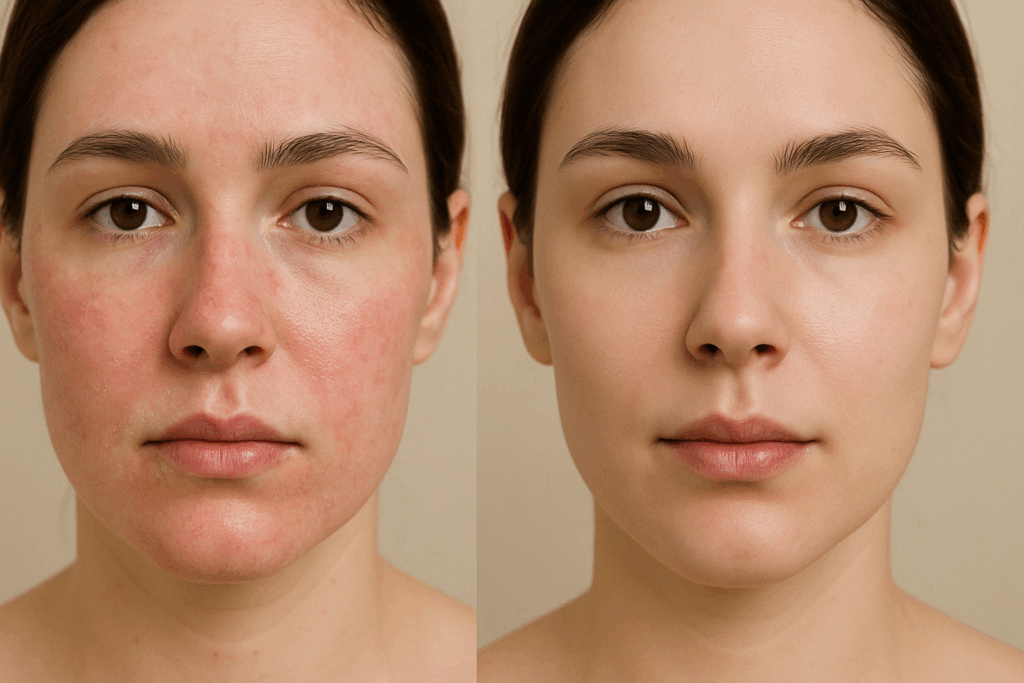
When Retinol Use Goes Wrong: Identifying Irritation, Allergies, and Adverse Reactions
Although purging is a temporary and expected part of the adjustment process, there are scenarios where breakouts or discomfort indicate an adverse reaction rather than a natural phase. When users experience burning, peeling, excessive redness, or acne in previously unaffected areas, the issue may not be purging but irritation. This is particularly relevant for sensitive skin types or for those who begin with a high-strength retinol product.
For individuals searching “does retinol cause breakouts,” it’s important to assess not just the number of pimples but also the broader skin response. Unlike purging, which typically affects known breakout zones, irritation can manifest as widespread inflammation, dryness, or eczema-like symptoms. In such cases, the acne-like response may not be related to accelerated turnover but rather to a compromised skin barrier or allergic reaction.
Understanding this distinction is vital for managing expectations and determining next steps. Dermatologists often recommend starting with a low concentration and gradually increasing frequency to reduce the likelihood of irritation. For those especially concerned about whether retinol and pimples are compatible, this slow introduction can provide clarity and comfort during the early stages.
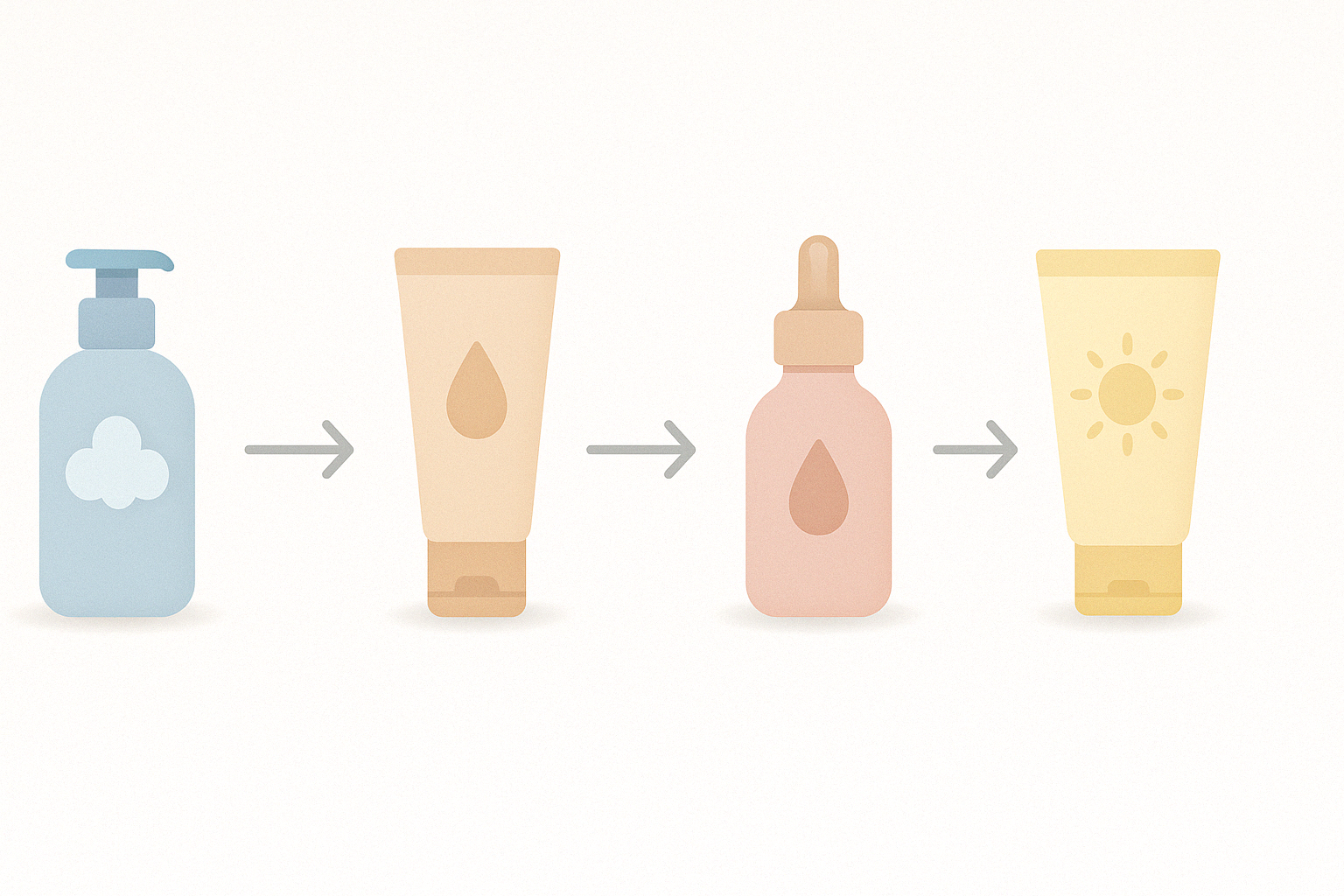
Strategies to Minimize the Risk of Purging and Maximize Benefits
Navigating the retinol purge requires patience and a thoughtful approach to skincare. For users apprehensive about whether retinol causes pimples or whether retinol for spots is the right choice, a few strategic steps can significantly reduce discomfort and improve outcomes. First, starting with a low concentration—such as 0.025%—allows the skin to adapt gradually without becoming overwhelmed.
Equally important is supporting the skin barrier with a well-rounded routine that includes gentle cleansers, non-comedogenic moisturizers, and sunscreen. Many dermatologists also recommend buffering retinol by applying a moisturizer first to minimize absorption and reduce irritation. This technique can be particularly helpful during the first few weeks, when skin is still adjusting.
Frequency matters as well. Rather than diving into daily use, applying retinol every third night and slowly increasing to alternate nights—and eventually nightly—can make the difference between manageable purging and overwhelming side effects. This slow ramp-up not only helps control breakouts but also builds long-term skin tolerance. These steps reassure users questioning, “can retinol cause pimples?” that while it may provoke some initial breakouts, the risk can be managed with intention.
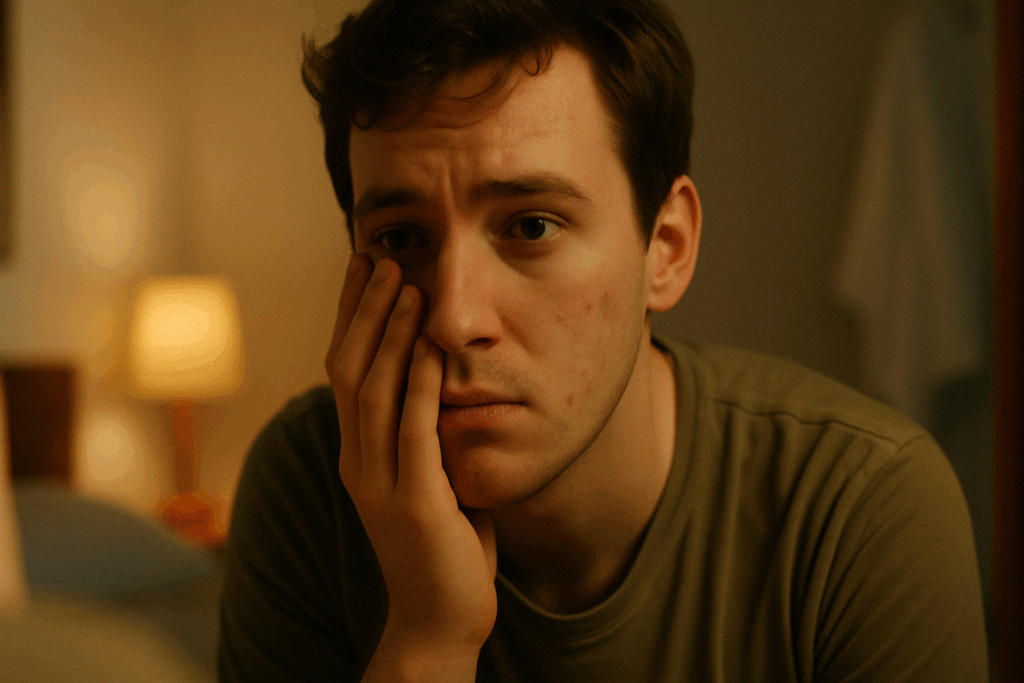
Mental Health and the Emotional Toll of Skin Changes
Beyond the physical symptoms, the psychological effects of worsening acne during retinol use deserve thoughtful attention. Acne can impact self-esteem, confidence, and social engagement—especially when expectations of improvement are not met quickly. The disappointment of seeing more pimples after starting treatment can create frustration and anxiety, particularly for those who have struggled with skin issues for years.
This is where emotional resilience and informed decision-making become essential. For those wondering, “why does retinol cause acne when it’s supposed to help?” it’s helpful to reframe the process as a necessary transition rather than a setback. Education, support, and proper skin guidance can turn confusion into clarity. Mental health professionals and dermatologists alike recognize that the emotional toll of acne is real—and supporting both skin and psyche is vital to a successful outcome.
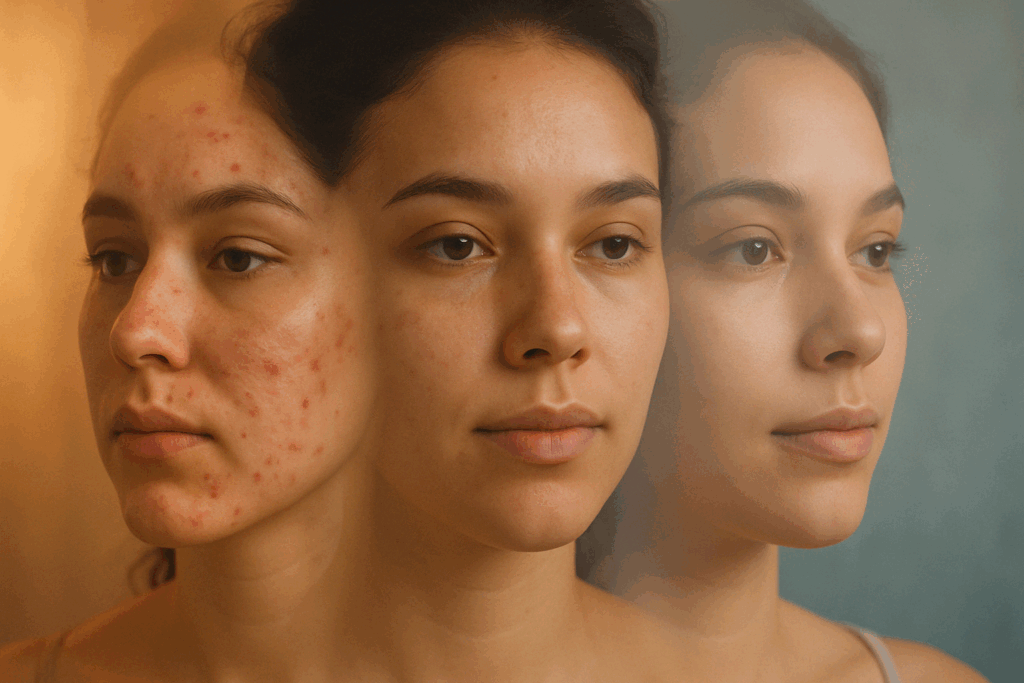
The Skin’s Healing Timeline: When to Expect Visible Results
One of the most frequent questions among new users is: how long does it take for retinol to work? The timeline varies, but most individuals begin to notice visible improvements after 8 to 12 weeks of consistent use. This includes reduced acne lesions, smoother texture, and diminished pigmentation from older breakouts. For some, especially those with more resilient skin, changes may appear even sooner.
However, full skin regeneration and long-term improvements may take up to six months. This extended timeline underscores the importance of patience. Retinol is not a quick fix; it is a long-term investment in skin health. Recognizing this can help alleviate the stress that often accompanies the early stages of treatment. Users who persevere through the initial purging phase are often rewarded with clearer, more radiant skin—and the emotional benefits that accompany it.
Separating Fact from Fiction: What Retinol Really Does for Acne
There are many misconceptions surrounding retinol and its role in acne treatment. Some believe that if a product causes breakouts, it should be discontinued immediately. Others assume that any skin peeling or dryness is a sign of harm rather than healing. In reality, these symptoms are often transient and indicative of the skin adjusting to a new, more accelerated cellular process.
To answer the question “what does retinol do for acne,” it’s important to understand its comprehensive effects. Retinol clears pores, reduces inflammation, normalizes desquamation (shedding of skin cells), and stimulates collagen—all of which contribute to both immediate and long-term improvements in acne-prone skin. It addresses multiple root causes of acne simultaneously, making it more effective than many single-action treatments.
Furthermore, the benefits of retinol are cumulative. Each cycle of cell turnover improves skin resilience and reduces the likelihood of future breakouts. The key is consistency, not perfection. Even occasional use can yield noticeable improvements over time. For those wondering whether retinol and pimples are ever truly compatible, the answer lies in this slow, persistent progress.
How to Tell If Retinol Is Working—or If It’s the Wrong Fit for Your Skin
Not all acne treatments work for everyone, and retinol is no exception. While many benefit greatly, others may find that it exacerbates issues or fails to deliver meaningful change. So how can you tell if retinol is working or if it’s time to consider alternatives?
Generally, if purging subsides within six to eight weeks and clearer skin follows, that’s a good sign that the product is effective. On the other hand, if breakouts persist beyond that point or are accompanied by ongoing redness, itching, or discomfort, it may be time to adjust the regimen. Consulting a board-certified dermatologist is the best course of action in such scenarios.
Questions like “will retinol cause breakouts” or “does retinol help pimples” ultimately depend on individual skin biology, product formulation, and application consistency. There is no one-size-fits-all answer, but there are clear guidelines that help determine whether retinol is delivering on its promise—or whether another approach may be more suitable.
Frequently Asked Questions: Retinol and Acne Treatment
1. Can using retinol actually trigger long-term acne problems instead of solving them?
While retinol is widely regarded as an effective treatment for acne, in rare cases, long-term use may aggravate underlying conditions such as rosacea or perioral dermatitis. This does not mean that retinol and pimples are inherently incompatible, but it highlights the importance of monitoring how your skin evolves over months—not just weeks. If you consistently experience inflammation, texture changes, or persistent breakouts in new areas, the product formulation may not be suited to your skin type or condition. While questions like “does retinol cause acne?” are common, it’s more accurate to consider whether retinol is exacerbating a separate, undiagnosed issue. In such cases, a dermatologist can determine whether the problem is purging, product incompatibility, or a deeper dermatological concern.
2. How does the climate or season affect how retinol interacts with acne-prone skin?
Environmental factors like humidity, temperature, and sun exposure can significantly impact how your skin tolerates retinol. In colder, drier months, retinol can cause more irritation and peeling, which might lead some to mistakenly believe that it causes acne. In truth, this increased sensitivity may allow bacteria and debris to penetrate a compromised skin barrier more easily. Conversely, in humid weather, excess oil and sweat may amplify purging, giving the impression that retinol for spots is backfiring. Being mindful of seasonal changes can help minimize discomfort and prevent the misinterpretation that retinol causes pimples when, in fact, external conditions are contributing factors.
3. Is it safe to use other acne treatments alongside retinol, or will that make breakouts worse?
Combining treatments like salicylic acid, benzoyl peroxide, or niacinamide with retinol can be beneficial, but it requires a strategic approach. When used improperly, layering multiple actives may irritate the skin barrier and exacerbate breakouts, leading some to believe that retinol causes breakouts. However, when spaced out appropriately—such as using benzoyl peroxide in the morning and retinol at night—these combinations can enhance results. This is especially relevant when using retinol for acne spots that have both inflammatory and comedonal features. Consulting a dermatologist helps ensure compatibility and reduce the misconception that retinol and pimples are an incompatible match when it’s really a question of synergy and timing.
4. Can diet or lifestyle changes reduce the risk of purging when starting retinol?
Emerging research suggests that a nutrient-rich, anti-inflammatory diet may support the skin’s response to retinol, potentially minimizing the severity of purging. While retinol a and acne treatment work at the cellular level, lifestyle factors like stress, sleep, and sugar intake influence hormonal fluctuations that affect skin clarity. Some patients report fewer initial breakouts when avoiding dairy and refined sugars, which are linked to acne exacerbation. Staying hydrated and ensuring sufficient intake of vitamins A, C, D, and zinc can also support skin resilience during retinol use. While retinol helps with acne at the topical level, holistic support often plays an underrated yet critical role in how the skin adjusts.
5. Are there any differences in how men and women respond to retinol for acne?
Although the core skin biology is similar across genders, hormonal differences may influence how men and women react to retinol. Women, particularly those experiencing hormonal fluctuations due to menstrual cycles or contraception, may have more variable responses when using retinol for spots or acne scars. Men, on the other hand, often have thicker, oilier skin, which can initially tolerate stronger concentrations but may also produce more sebum that contributes to clogged pores during purging. These hormonal and structural differences don’t mean retinol is better suited to one gender over the other, but they do influence how acne presents—and how users perceive whether retinol causes pimples or helps resolve them. Personalizing the routine accordingly can lead to more consistent outcomes for both sexes.
6. Can over-the-counter (OTC) retinol be as effective as prescription-strength retinoids for acne?
OTC retinol products are milder than prescription retinoids like tretinoin, adapalene, or tazarotene. While they often work more slowly, they can still offer substantial benefits with fewer side effects. Individuals who are sensitive or prone to irritation may find that starting with OTC retinol helps them avoid the kind of purging that leads people to question if retinol causes acne. In fact, gradual skin acclimation through OTC products can provide a smoother transition, reducing the need to ask, “why does retinol cause acne in some users but not others?” For moderate to severe acne, however, prescription options may be more effective, provided they’re introduced cautiously and under medical supervision.
7. How does retinol interact with darker skin tones when treating acne and pigmentation?
For individuals with melanin-rich skin, post-inflammatory hyperpigmentation (PIH) is a more prominent concern than scarring. Retinol for acne spots is especially effective in these cases, as it promotes exfoliation and improves skin tone uniformity over time. However, those with darker skin must be cautious, as overuse or irritation from high-strength retinol can lead to rebound pigmentation or hypopigmented patches. This is why many dermatologists recommend pairing retinol with barrier-supportive ingredients like ceramides or hyaluronic acid. When properly managed, retinol acneärr reduction can be both safe and transformative for skin of color.
8. What are some emerging alternatives to traditional retinol for acne?
While retinol remains a gold standard, newer bio-retinoids and retinol analogs like bakuchiol, granactive retinoid, and retinaldehyde are gaining traction. These alternatives provide similar benefits with lower irritation risk, appealing to individuals who fear that retinol causes pimples or worsens breakouts. Although these options may not penetrate as deeply as retinol, they’re showing promise in reducing acne inflammation and refining skin texture. For those unable to tolerate standard retinol a and acne regimens, these innovations offer hope and flexibility without sacrificing results. However, long-term data is still needed to compare their efficacy to traditional vitamin A derivatives.
9. How can I tell if my retinol-induced breakout is purging or an allergic reaction?
The location, type, and timing of breakouts are crucial in making this distinction. Purging usually involves clusters of whiteheads or small pustules in areas where you normally get breakouts, while allergic reactions tend to include widespread redness, swelling, or rash in new areas. If the irritation persists or worsens despite proper hydration and spacing of applications, it may be a sign of an underlying sensitivity to other ingredients in the product. This often leads people to mistakenly ask, “can retinol cause acne when it’s actually an allergic flare-up?” Patch testing or switching formulations can help clarify whether the breakout is due to purging or incompatibility.
10. Does stopping retinol after purging harm the skin or make acne worse?
Abruptly discontinuing retinol during or after purging may lead to temporary skin regression, as your skin adjusts to the absence of the active ingredient. While stopping won’t inherently damage your skin, it may result in renewed congestion or breakouts, especially if you don’t replace it with another acne-fighting ingredient. Some users worry that retinol causes pimples because their skin worsens after discontinuation, when in fact it’s the loss of its exfoliating and anti-inflammatory effects. If you do decide to stop, tapering use gradually or transitioning to a milder active like azelaic acid can help maintain clarity. Strategic cessation ensures that retinol for acne spots doesn’t leave users feeling as if their progress was undone overnight.
Final Thoughts on Retinol, Breakouts, and the Journey to Clearer Skin
For those navigating the ups and downs of acne treatment, the early phase of using retinol can be both frustrating and confusing. It’s easy to feel disheartened when skin seems to worsen before it improves. Yet understanding the reasons behind purging—why retinol causes acne in some users initially—can offer reassurance that the treatment is working beneath the surface.
When used thoughtfully and consistently, retinol for acne spots, pimples, and scarring offers transformative benefits. The path to clearer skin is rarely linear, but it is often worth the wait. For individuals asking, “can retinol help with acne?” or “is retinol good for pimples?” the evidence overwhelmingly points to yes—especially when guided by realistic expectations and proper skincare support.
Retinol remains one of the most effective and well-researched treatments for acne. While it may cause temporary discomfort, its long-term results include not only smoother, healthier skin but also improved confidence and mental well-being. As with many health interventions, the journey requires time, patience, and a willingness to push through discomfort in pursuit of lasting change.
Ultimately, retinol is not a miracle cure—but it is a powerful ally in the fight against acne when used with intention, education, and self-compassion.
Was this article helpful? Don’t let it stop with you. Share it right now with someone who needs to see it—whether it’s a friend, a colleague, or your whole network. And if staying ahead on this topic matters to you, subscribe to this publication for the most up-to-date information. You’ll get the latest insights delivered straight to you—no searching, no missing out
Further Reading:
Is Your Skin Retinol Purging?: 3 Signs To Watch Out For
What is Retinol and Why Can it Cause Skin Purging
Skin Purging vs. Breakout – How to Tell the Difference
Disclaimer
The information contained in this article is provided for general informational purposes only and is not intended to serve as medical, legal, or professional advice. While Health11News strives to present accurate, up-to-date, and reliable content, no warranty or guarantee, expressed or implied, is made regarding the completeness, accuracy, or adequacy of the information provided. Readers are strongly advised to seek the guidance of a qualified healthcare provider or other relevant professionals before acting on any information contained in this article. Health11News, its authors, editors, and contributors expressly disclaim any liability for any damages, losses, or consequences arising directly or indirectly from the use, interpretation, or reliance on any information presented herein. The views and opinions expressed in this article are those of the author(s) and do not necessarily reflect the official policies or positions of Health11News.